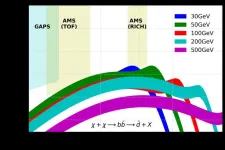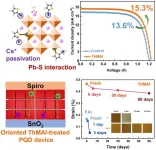(Press-News.org)
The oceans are warming at an alarming rate. 2023 shattered records across the world’s oceans, and was the first time that ocean temperatures exceeded 1oC over pre-industrial levels. This led to the emergence of a series of marine heatwave events across both hemispheres, from the waters around Japan, around South America, and across the wider North Atlantic. Marine heatwaves are periods of extremely warm sea temperatures that can form in quite localized hot spots but also span large parts of ocean basins. By definition, they have to last five days to be classed as a marine heatwave, but some major events have lasted months — even years, in an extreme case.
Notable events have led to catastrophic impacts on marine ecosystems, the economy and coastal communities. For example, coral bleaching in the tropics has caused huge losses to the tourism industry, mass mortalities or major shifts in fisheries have impacted fishing industries worldwide, and vast losses of sea grass meadows and kelp forests have decimated countries’ natural capital.
Closing a crucial gap in our understanding
The UK has largely escaped any major marine heatwaves that could have caused notable impacts to marine ecosystems and the blue economy. However, in June 2023 a short-lived but intense event materialized around the shores of the UK and Ireland, which was widely documented in the media. The impacts of this heatwave remain unknown, highlighting a crucial gap in our understanding of past marine heatwaves’ characteristics around the UK and what their potential future impacts may be.
In our new article, we characterized both marine heatwaves and their opposites — marine cold spells — around the UK for the first time. UK waters do not appear as a major hot spot across the wider North Atlantic, with the Gulf Stream and central subpolar gyre experiencing the greatest heatwave and cold spell activity respectively. However, when zooming in on UK waters, regional variability becomes apparent, particularly for marine heatwaves. On average, the southern North Sea and English Channel tend to experience longer (around a month) and moderately intense (maximum temperatures reaching 1.5oC higher than expected) heatwaves, whereas the eastern North Sea has a tendency to experience shorter (two to three weeks) but more intense (maximum temperatures >3oC) heatwaves.
Considerable variability exists
Marine heatwaves are documented all around the UK, lasting up to five months and occurring throughout the year, even in winter. When investigating individual events, it is evident that considerable variability exists in terms of location, intensity, duration and time of year. This high variability may also explain the inconsistent response in chlorophyll-a, a proxy for phytoplankton abundance.
Our research reveals that chlorophyll-a extremes do not coincide with temperature extremes in UK waters, although there is some indication that highly productive events, for which we have coined the term ‘greenwaves’, occur more frequently in the southern North Sea and closer to the coast. For the wider North Atlantic, marine heatwaves are more likely to co-occur with ‘bluewaves’ (low chlorophyll-a extremes) in the tropics and subtropics, while cold spells are more likely to co-occur with greenwaves at higher latitudes. The direct relationship between these types of extremes is inconsistent and needs more investigation around the UK. This may be due to the UK residing between mid- to high latitudes. Seasonality may also play a vital role.
Seasonal differences
The timing of events will also greatly affect the impacts on the wider marine ecosystem. For example, if a marine heatwave occurs at the height of summer, the thermal limits of species like seagrass or seaweed may be breached, which could lead to extensive damage or even mortality, which has been documented in other places worldwide. But if an event were to occur in winter or spring, the unseasonably warm temperatures may initiate phytoplankton blooms, possibly leading to either a temporary boost in productivity, greatly benefiting fisheries, or causing harmful algal blooms, leading to negative impacts.
Our research also shows that when marine heatwaves occur in the relatively shallow southern North Sea and English Channel, near-bottom oxygen concentrations tend to be extremely low, which puts benthic ecosystems under increased stress. For other locations around the UK, this relationship is apparent during the first half of the year, where the water column is well-mixed and the impact of extreme surface temperatures is able to reach the seafloor. During summer, the water column is not as well mixed, keeping the impacts of the marine heatwave confined to the surface.
Unique opportunity
Given the complexity of this region, it is vital that more targeted research is undertaken to understand the future impacts of marine heatwaves on marine ecosystems, the blue economy and society. If high-risk regions can be identified, the resilience of species and coastal communities can be assessed and properly managed.
The June 2023 marine heatwave should be perceived as an alarm bell. While these events do not appear to be as long-lasting or intense as other heatwaves around the world at the moment, they are projected to increase. This means that the UK is presented with a unique opportunity to take advantage of our head start and learn from other nations to increase preparedness and response capability for future extreme events.
END
One of the great challenges of modern cosmology is to reveal the nature of dark matter. We know it exists (it constitutes over 85% of the matter in the Universe), but we have never seen it directly and still do not know what it is. A new study published in JCAP has examined traces of antimatter in the cosmos that could reveal a new class of never-before-observed particles, called WIMP (Weakly Interacting Massive Particles), which could make up dark matter. The study suggests that some recent observations ...
Nearly three out of four kids in Chicago had no swimming lessons in summer of 2022, with significant racial and ethnic differences, according to a parent survey from Ann & Robert H. Lurie Children’s Hospital of Chicago published in Pediatrics. Black and Hispanic/Latine kids were disproportionately affected (85 percent and 82 percent, respectively), compared to white kids (64 percent).
The most common reasons for not getting swimming lessons also differed among racial and ethnic groups. Parents of White kids reported they ...
□ Professor Jongmin Choi’s team from the Department of Energy Science and Engineering at DGIST (President Kunwoo Lee) conducted joint research with Materials Engineering and Convergence Technology Professor Tae Kyung Lee from Gyeongsang National University and Applied Chemistry Professor Younghoon Kim from Kookmin University. The researchers developed a new method to improve both the performance and the stability of solar cells using “perovskite quantum dots.” They developed longer-lasting solar cells by addressing the issue of distortions on the surface of quantum dots, which deteriorate the ...
Rehearsing alternative outcomes of discarding through imagery rescripting shows promise as a treatment strategy for people who hoard, a study by UNSW psychology researchers has shown.
Hoarding disorder is a highly debilitating condition that worsens with age. People who hoard form intense emotional attachments to objects, accumulate excessive clutter, and have difficulty discarding possessions. Many avoid treatment.
People who hoard also experience more frequent, intrusive and distressing mental images in their daily lives, says Mr Isaac Sabel from the Grisham Research Lab, an experimental clinical psychology research group at UNSW Sydney.
“Negative ...
The dental health benefits of adding fluoride to drinking water may be smaller now than before fluoride toothpaste was widely available, an updated Cochrane review has found.
The team of researchers from the Universities of Manchester, Dundee and Aberdeen reviewed the evidence from 157 studies which compared communities that had fluoride added to their water supplies with communities that had no additional fluoride in their water. They found that the benefit of fluoridation has declined since the 1970s, when fluoride toothpaste became more widely available.
The contemporary studies were conducted in high-income countries. The impact of community water fluoridation ...
Toddlers in the UK obtain nearly half (47%) of their calories from ultra-processed foods (UPFs), and this rises to 59% by the age of seven, according to a new study led by UCL researchers.
The study, published in the European Journal of Nutrition, looked at data from 2,591 children born in the UK in 2007 and 2008 whose parents recorded what their children ate and drank over three days.
The most common UPFs consumed by the toddlers – who were 21 months when their parents recorded their diets – were flavoured ...
DETROIT — A new grant will help Wayne State University researchers explore the links between bacterial infections, the environmental factors that increase their susceptibility and the risk of preterm birth.
The five-year, $2,858,821 grant from the National Institute of Environmental Health Sciences of the National Institutes of Health, “PFAS increases susceptibility to infection-mediated preterm birth,” will be led by Michael Petriello, Ph.D., assistant professor in Wayne State’s Institute of Environmental Health Sciences and Pharmacology in the School of Medicine.
Petriello hopes that the team’s studies will identify critical pathways responsible ...
Highlights:
Antimicrobial resistance is a growing threat.
Bacteria exchange AMR genes in the gut via circular genetic material called plasmids.
In lab experiments, bacteria transferred plasmids with AMR genes in the presence of zinc at reduced or nonexistent rates.
Stopping the transfer without killing microbes may help reduce AMR without disrupting the gut microbiome.
Washington, D.C.—Genes responsible for antimicrobial resistance (AMR) can spread from microbe to microbe through circular genetic material called plasmids, and ...
On October 3, 2024, NASA announced that two space probes proposed by University of Maryland astronomers have advanced to the next round of consideration for a $1 billion mission slated to launch into orbit in 2032.
The selected probes include the Advanced X-ray Imaging Satellite (AXIS) mission with UMD Astronomy Professor Christopher Reynolds as its principal investigator and the PRobe far-Infrared Mission for Astrophysics (PRIMA) with UMD Astronomy Professor Alberto Bolatto as a co-investigator and NASA Goddard Space Flight Center researcher and UMD Astronomy ...
MSU has a satellite uplink/LTN TV studio and Comrex line for radio interviews upon request.
Images and Podcast
EAST LANSING, Mich. – In recent years, some states have prioritized purging their voter rolls of those who have passed away or moved out of state. During election season, there is often increased discussion about the necessity and impact of these actions. Voter purging can be an important step for creating election integrity, but others have raised concerns about how the process is conducted and who it targets.
So, are there negative effects of voter purging? Researchers from Michigan State University wanted to find out — especially ...



